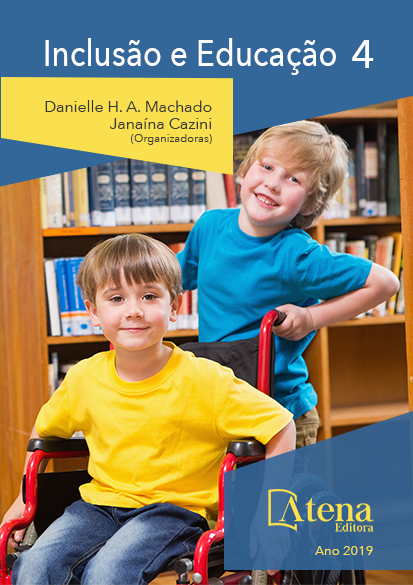
SABERES NECESSÁRIOS PARA UMA EDUCAÇÃO INCLUSIVA
O objetivo desta pesquisa é investigar
a formação e a prática dos professores dos anos
iniciais da escola regular, verificando se eles
têm uma formação adequada para receberem,
na sala de aula convencional, alunos com
Transtornos Globais do Desenvolvimento,
Altas Habilidades ou Superdotação; e, se as
estratégias pedagógicas utilizadas por esses
profissionais favorecem o desenvolvimento da
aprendizagem desses estudantes. Desse modo,
a referida pesquisa busca contribuir, de certa
maneira, para que muitos educadores repensem
inclusivamente os procedimentos utilizados
em sala de aula; para que o educador saiba
guiar e estimular esses estudantes, fazendo
com que eles tenham uma aprendizagem
significativa, abrindo espaço para mostrarem
suas criatividades. Para tanto, esta pesquisa
de campo é de natureza qualitativa, elaborada
metodologicamente com base nas concepções
dos seguintes autores: Tardif (2002), Nóvoa
(1995), Silva (2009), Paula (2007), Martins
(2010-2012), Morrin (2003), dentre outros. Sob
essa lógica, os autores supracitados tiveram
a finalidade de nortear o nosso percurso
interpretativo, elencando discussões acerca
da formação dos professores e como trabalhar
em uma perspectiva inclusiva. Desse modo,
considerando os dados coletados e o aporte
teórico-metodológico exposto, discutimos
acerca dos aspectos que envolvem a prática
docente com alunos com Transtornos Globais
do Desenvolvimento, Altas Habilidades ou
Superdotação, refletindo sobre a educação
inclusiva, em conformidade com os aspectos
sociais do contexto. Foi possível destacar
a importância da utilização de ferramentas
pedagógicas, pelos professores, que priorize
uma educação inclusiva.
SABERES NECESSÁRIOS PARA UMA EDUCAÇÃO INCLUSIVA
-
DOI: 10.22533/at.ed.32219150120
-
Palavras-chave: Formação de professores, Educação inclusiva, Prática docente.
-
Keywords: Teacher training, Inclusive education, Educational practice.
-
Abstract:
The objective of this research is
to investigate the formation and the teachers’ of
the years practice begin of the regular school,
checking if they have adequate training to
receive students with Global Developmental
Disorders, Abilities High or Giftedness in the
conventional classroom; and if the pedagogical
strategies used by these professionals favor
the students’ learning development. Thus, this
research seeks to contribute, in a certain way, so
that many educators also rethink the procedures
used in the classroom; so that the educator can guide and stimulate these students,
making them have a meaningful learning, opening space to show their creativity. To
do so, this field research is of a qualitative nature, elaborated methodologically based
on the conceptions of the following authors: Tardif (2002), Nóvoa (1995), Silva (2009),
Paula (2007), Martins (2003), among others. Under this logic, the aforementioned
authors had the purpose of guiding our interpretative course, listing discussions about
the formation of teachers and how to work in an inclusive perspective. Thus, considering
the data collected and the theoretical-methodological contribution exposed, we discuss
the aspects that involve the teaching practice with students with Global Developmental
Disorders, Abilities High or Giftedness, reflecting on inclusive education, in accordance
with the social aspects of the context. It was possible to highlight the importance of the
use of pedagogical tools, by the teachers, that prioritize an inclusive education.
-
Número de páginas: 15
- Ana Paula Lima Carneiro
- Ananeri Vieira de Lima


